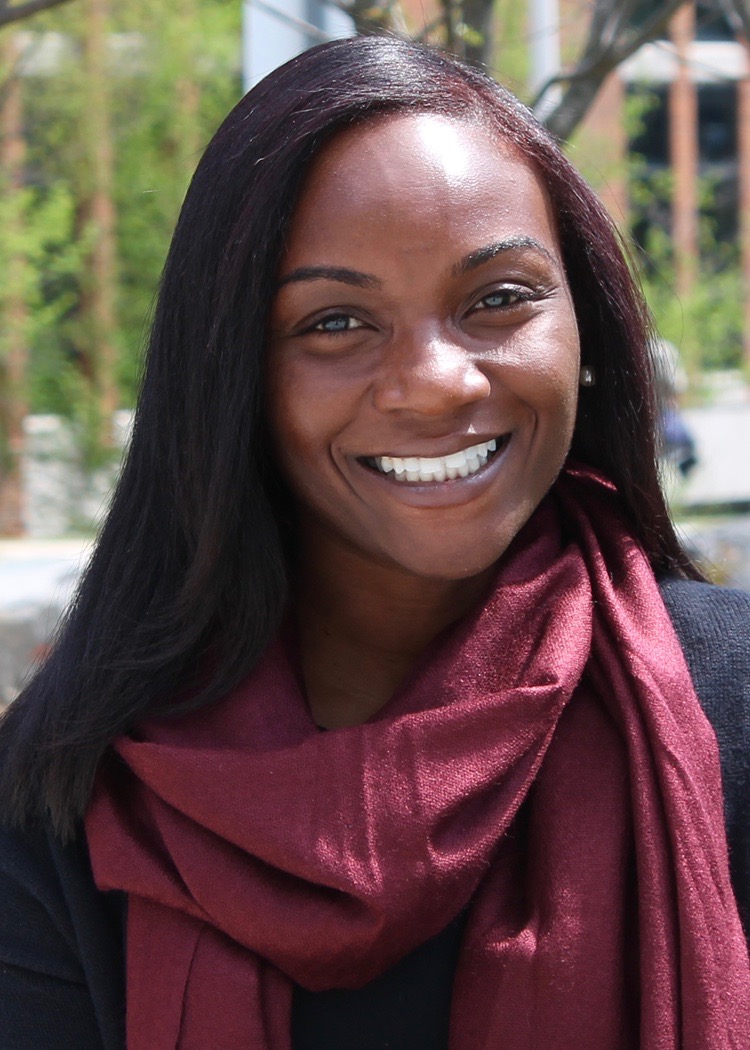Dr. Kizzmekia Corbett (1986 - ) Shortly after receiving her PhD in Microbiology and Immunology, Dr. Corbett joined NIH as a postdoctoral fellow and an immunologist with the adjacent National Institute of Allergy and Infectious Diseases (NIAID). She began her research at NIH working on the development of vaccines for Severe Acute Respiratory Syndrome (SARS) and Middle East Respiratory Syndrome (MERS), two types of coronaviruses. Along with members of her team, Dr. Corbett identified the “spike protein” in COVID-19, when the virus emerged in December 2019. The claw-like shape of the protein, the spike, permeates healthy human skin, infecting the person with the virus.
Because of that work, Dr. Corbett was chosen to lead the team of scientists who partnered with the biotechnology company Moderna in development of a promising vaccine that uses a genetic code sequence to prompt the body’s immune system to react when the spike protein is detected, thus blocking the infection process. In March, 2020, when a bill was signed authorizing an $8.3 billion dollar emergency coronavirus response, which included at least $3 billion for accelerated research, Corbett and the team tackled the job of developing a vaccine and treatment.
In addition to helping design the vaccine, Dr. Corbett led the preclinical studies for the Phase I clinical trial and worked to create the assays used to test clinical trial samples. During the Moderna vaccine trials, Corbett worked to ensure that people of color were included in the studies in numbers reflective of their proportion of the general population. In December of 2020, the U.S. Food and Drug Administration (FDA) issued an emergency use authorization (EUA) for the Moderna mRNA COVID-19 vaccine.
In the spring of 2021, Dr. Corbett became an assistant professor of immunology and infectious diseases at the Harvard T.H. Chan School of Public Health, heading the Coronaviruses & Other Relevant Emerging Infectious Diseases (CoreID) Lab. She is also the Shutzer Assistant Professor at the Harvard Radcliffe Institute.
Early Childhood and Education
Kizzmekia “Kizzy” Corbett was born on January 26, 1986, in Hurdle Mills, a rural North Carolina town. She was raised in Hillsborough, located near Durham and Chapel Hill, living with her mother, Rhonda Brooks, her stepfather and several siblings, including step and foster siblings.
The family recognized that Kizzmekia had a bright and inquisitive mind early on and noticed her strong determination and drive. “Kizzy was always like a detective,” her mother recalled.
As a child, Dr. Corbett would describe her goal as being the first Black woman to win the Nobel Prize in Medicine. Her mother noted, “When she’s got her mind set on something, it’s set. She can do anything”. Also apparent from childhood was Kizzmekia’s compassion and care for others, as reflected when she asked her mother, if a friend from school with nowhere to go, could come and stay at their home.
Dr. Corbett’s school teachers encouraged her family to look for opportunities to nurture and challenge their budding scientist. In high school, Corbett was selected for ProjectSEED, a summer program established by the American Chemical Society that provides opportunities for students from traditionally underrepresented groups to explore science careers.
After graduating from high school, Corbett attended the University of Maryland, Baltimore County (UMBC) with a full scholarship in the Meyerhoff Scholars Program, aimed at increasing diversity among future leaders in STEM. She also worked summers at the National Institutes of Health (NIH) in the Vaccine Research Center. She worked in the lab of Dr. Barney Graham, who would later become a career mentor and her supervisor. In addition to her laboratory research studies and internships, Corbett also developed an interest in sociology. She graduated in 2008 with a double major in biological sciences and sociology.
Dr. Corbett pursued her doctoral studies at the University of North Carolina-Chapel Hill studying antibody responses to dengue fever virus. After receiving her PhD, she joined the NIH as a postdoctoral fellow.
Awards
Dr. Corbett has received numerous awards, including The 2020 Golden Goose Award from the American Association for the Advancement of Science (AAAS), the 2020 Norman P. Salzman Memorial Award in Basic and Clinical Virology from the Foundation for National Institutes of Health, the 2020 Early Career Applied and Biotechnological Research Award from the American Society for Microbiology, the 2021 Benjamin Franklin NextGen Award from the Franklin Institute, and the 2021 African Americans in Health Care Award from Kaiser Permanente.
Kizzmekia Corbett of Harvard T.H. Chan School of Public Health has been named “Federal Employee of the Year” along with her colleague Barney Graham for conducting groundbreaking research while working at the National Institute of Health’s Vaccine Research Center that led to the development of COVID-19 vaccines.Corbett and Graham are among 13 winners of the 2021 Samuel J. Heyman Service to America medals, which honor excellence in the federal workforce.
Kizzmekia Corbett, assistant professor of immunology and infectious diseases at Harvard T.H. Chan School of Public Health, was named one of the 2021 Bostonians of the Year by the Boston Globe for her pioneering research aimed at developing a COVID-19 vaccine and for creating an open dialogue about vaccines with a sometimes distrustful public. A December 15, 2021 article in the Globe described Corbett’s passion for science and her work at the National Institutes of Health researching coronavirus spike proteins and mRNA vaccine technology, which began long before the COVID-19 pandemic emerged and which proved critical to developing vaccines in record time.
Kizzmekia Corbett of Harvard T.H. Chan School of Public Health was named one of four “heroes of the year” for 2021 by TIME magazine for helping develop the mRNA-based vaccine platform that enabled the creation of innovative and highly effective COVID-19 vaccines.Corbett, assistant professor of immunology and infectious diseases, worked on vaccine development while at the Vaccine Research Center (VRC) of the U.S. National Institute of Allergy and Infectious Diseases, as part of the team working with Barney Graham, former deputy director of the VRC. Graham was also named a TIME hero, as were biochemist Katalin Kariko and immunologist Drew Weissman, whose work also played a key role in the development of the mRNA platform.

